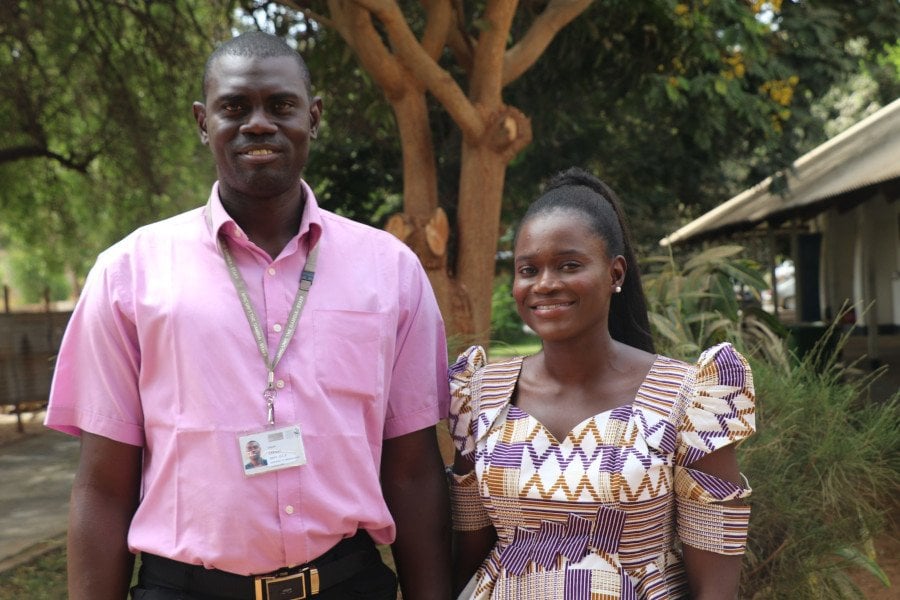
Omar Ceesay and Fatou Jaiteh from MRCG at LSHTM
New research published in the BMC Malaria Journal has shown that nuanced social dynamics greatly influence the decision-making process for participants in the MASSIV trial, a Mass Drug Administration (MDA) using ivermectin for malaria in the Upper River Region of The Gambia.
Mass Drug Administration (MDA) is an intervention used for the control and elimination of multiple infectious diseases. For malaria, it involves giving medication to an entire population, such as a village, before peak malaria season in order to prevent the disease from occurring. For MDA to be successful in preventing malaria, it is important to achieve high levels of coverage and adherence.
Researchers from the Medical Research Council Unit The Gambia at LSHTM, conducted a social science study to understand the factors that prevented or facilitated people in taking the medication in the MASSIV trial. All phases of the trial, including sensitisation meetings, trial enrollment, and the distribution of medication, were observed. In addition, the team conducted one 150 in-depth interviews and 11 focus group discussions with people who took the medication, people who did not take the medication, village leaders (Alkalos, VDCs, TBAs, etc.), and MRCG at LSHTM staff. A survey of 864 randomly selected individuals was also carried out in the villages where the MDA was taking place.
The results of the study showed that in general, people in the villages were accepting of the MDA and supported it taking place in their village. Many took the medication because they recognised malaria as a health concern that impacts not only their health, but also their farming and domestic duties and school attendance. Furthermore, they found it difficult and costly to go to the health facility for treatment when they get malaria.
The results also revealed various reasons for which people did not take the medication. Some stated that they were away from the village at the time or were too busy with farming demands. Some people were also afraid of experiencing side effects of the medication like nausea or dizziness. Beyond these factors – common in previous MDA strategies – the study also showed that the social dynamics of the communities played a vital role in people taking or not taking the medication. For example, people were more likely to take the medication if their husband, wife, or their compound head also took it. The social cohesion of the communities was also an important factor: people found that if the village made the decision to participate in the MDA as a group, it was important to support that decision and do what was best for the entire community. Trust in the MRCG at LSHTM as a provider of the medication also played a role in communities’ acceptance of the medication.
This study demonstrates that taking MDA medication is far more complex than an individual making one decision to adhere to treatment or not. Rather, it is a process with multiple revaluations heavily influenced by individual position, as well as relationships with families, compounds, villages, and health providers. Factors influencing involvement in each phase vary and should be differently addressed in order to effectively implement and fairly assess future MDA strategies in this context.
Omar Ceesay, Scientific Office MRCG at LSHTM, was involved in the study and said, “I have gained experience in social science at the MRCG at LSHTM from 2017 to date, thanks to my work with the social sciences team of the MASSIV Trial. This first manuscript of factors influencing involvement in mass drug administration with ivermectin for malaria elimination in The Gambia has whetted my appetite for scientific research and will contribute to my track record to becoming an independent researcher. My goal is to pass these skills on to junior scientists and develop a regional network of excellence with fellow African researchers.”
Fatou Jaiteh, a final year PhD student at the MRCG at LSHTM and the Unit of Socio-Ecological Health Research (SEHR) at the Institute of Tropical Health, Antwerp (ITM), was also part of the study trail team. Fatou’s involvement in the study was relevant to further understand the dynamics of variations of mass treatment campaign designs and community response. Her interest also lies in understanding the social and ecological factors that influence malaria transmission in urban settings.
Omar and Fatou’s contributions further highlight the MRCG at LSHTM’s commitment to strengthening social science research through opportunities and support for young researchers.
If you enjoyed this article and would like to build a career in global health, we offer a range of MSc programmes covering health and data, infectious and tropical diseases, population health, and public health and policy.
Available on campus or online, including flexible study that works around your work and home life, be part of a global community at the UK's no.1 public health university.
